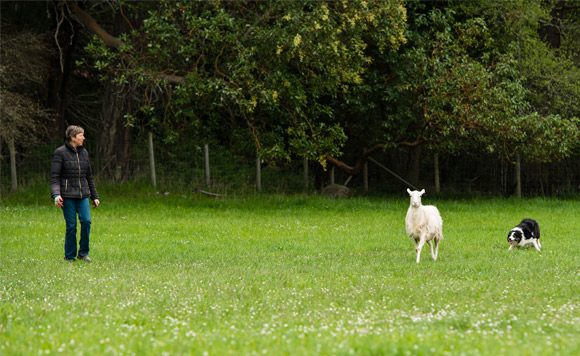by Paula Kully –
I love dogs and I know I’m not alone in this here on the Saanich Peninsula. No matter where you go, you will find people and their fur friends out and about. People love their pets and go to great lengths to keep them happy and healthy.
This includes training. We are fortunate to have one of the top dog handlers on the Island right here in North Sannich. Julie Carter, Head Instructor and Owner of West Coast Canine Academy, is a three-time Regional Agility Champion and much sought-after trainer. For 15 years, she has been providing instruction in herding, agility and obedience and is wholly devoted to her work, her dogs and her clients who come from all over the Island and the Lower Mainland.
Julie began her career in sheepdog training 14 years ago when she bought her first dog with the intention of competing in agility. The farmer who sold her the dog did so with the condition that she also train it for herding. She soon learned to love the work and the sport and discovered that everything she learned about training dogs came mainly from her experience with herding.
Border collies are one of the most popular breeds for herding due to their genetic instincts and high energy. They are used for both cattle and sheep, but the approach of the dog is significantly different. Cattle dogs sometimes need to nip heels and noses to move cows, whereas sheep dogs use their eye to manoeuvre their timid quarry.
People who are serious about competing in “trails” (herding competitions) look for a dog whose lineage includes winning parents and whose herding instincts are strong. This is identified in puppies when they are about six months old. The pups are placed into pens with sheep, and if they begin to chase, chances are they are going to make a good working dog.
By 10 months, female dogs begin their formal training. For males, this starts around 12 months. Julie starts working with the pup first to get them started and then brings in the owner and trains the pair together. Julie explains that the process is not about obedience, but instead developing a relationship with the dog. Based on its instinct, the dog wants to chase the sheep. Through hand gestures and a series of directional whistles, the handler guides the dog. In order to get to this level, the handler blocks the dog when they go in the wrong direction and only allows the dog to have the sheep when the dog moves in the direction the handler wants. Over time, and because the dog’s ultimate goal is to chase the sheep, the dog begins to trust and obey the handler’s direction until they are working as a unit.
Sheep dog owners compete in trials where they can test both their and the dog’s skills. Every province in the country has a Stock Dog Association, and many of the trials and events are promoted or hosted through these. There are various levels of competition including local, regional, the Western Canadian Finals, Canadian Finals and Nationals which include Canada and the United States. Trials test the dog’s ability to move sheep around a field, fences, gates and enclosures as directed by their handlers. Competitions involve various levels that range from Nursery to Open or beginners to experienced.
As one of the top handlers on the Island, Julie was approached to help revitalize the Metchosin Sheepdog Trials held at Swanwick Ranch. The event, which takes place July 28 and 29 this year, had run for some 20 years up until the organizers moved away. Julie has been involved in bringing the trials back to the community with a goal to make them some of the best in the country.
When Julie introduced me to her dogs, I was amazed by the discipline and easiness between them. They stay close to her, lean on her looking for affection, and are always ready for her direction. When she talks about her work and her dogs, there is visible emotion, passion, a sense of humble pride, and the kind of love that comes from the undisputable bond between Julie and her dogs.




